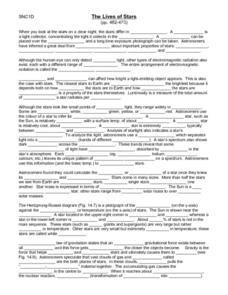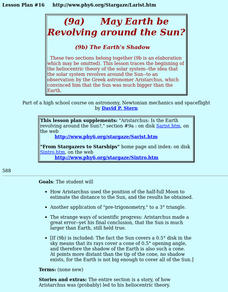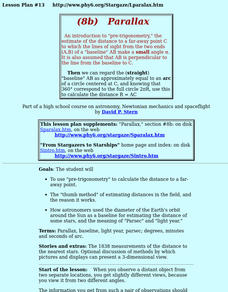Scholastic
Study Jams! The Moon
Take your class to the moon and back with this compact slide show. A mix of computer-generated images and photographs are supported by explanatory text. Observers learn about the moon's movements, its physical features, and its phases....
Curated OER
Astronomer sees a 'Brake' in Cosmic expansion
Seventh graders examine and read an article. In this investigative lesson students discuss questions about the article and complete an activity.
Curated OER
Speed of Light
In this speed of light worksheet, students read about Danish Astronomer ole Roemer and his discovery of the speed of light. Students complete 4 short answer questions based on the reading.
Curated OER
How Do We Know...?
Young scholars identify and explain how various inventions and astronomers have improved our appreciation of the universe. Students identify at least two constellations in the sky and discuss how they were used in ancient times to tell...
Curated OER
Herschel Infrared Experiment
Learners perform a version of the experiment of 1800 by the famous astronomer Sir Frederick William Herschel.
Curated OER
Our Solar System
Young scholars analyze the theories of the formation of the universe and solar system. Students analyze planetary motion and the physical laws that explain that motion: Rotation, Revolution, Apparent diurnal motions of the stars, sun,...
Curated OER
The Discovery of the Solar System
High schoolers study the ideas behind the heliocentric theory of Copernicus. They examine about retrograde motion of the planets as they move around the sun. They study astronomers who include Ptolemy, Copernicus, and Galileo.
Curated OER
`Great Debate' Lesson Plan for Undergraduates
Students study the Curtis- Shapley debate which highlighted the view of human place in the universe. They examine the clash of these two astronomers in a debate which took place in 1920.
Mr. E. Science
Stars, Galaxies and the Universe
It takes 225 million years for our sun to travel around the galaxy. The presentation covers astronomical units, light years, telescopes, types of stars, the life cycle of a star, and types of galaxies. This is the last lesson in a...
Curated OER
How Distant Is The Moon?
Students discover how Aristarchus, a Greek astronomer around 230 BC, used a simple observation of the eclipse of the Moon, plus clever reasoning, to deduce the distance of the Moon. They practice the same calculation technique.
Curated OER
The Lives of Stars
In this stars instructional activity, students review what makes up a star, how astronomers learn about stars, and the different types of stars including low mass and high mass stars. This instructional activity has 62 fill in the blank...
Curated OER
Measuring Elevation
Students practice measuring elevation, one of the key coordinates used by astronomers. They describe how the elevation of an object is measured.
and combine compass directions and elevation to find celestial objects.
Curated OER
May The Earth Be Revolving Around The Sun?
Young scholars trace the beginning of the heliocentric theory of the solar system--the idea that the solar system revolves around the Sun--to an observation by the Greek astronomer Aristarchus, which convinced him that the Sun was much...
Curated OER
Parallax
High schoolers discover how astronomers used the diameter of the Earth's orbit around the Sun as a baseline for estimating the distance of some stars, and the meaning of "Parsec" and "light year."
Curated OER
Teaching Poetry Using DARTs
Students interact with texts. They are given the first four lines of Walt Whitman's poem "When I heard the learned astronomer." Students read them and discuss what they think Walt Whitman did when he heard the astronomer.
Curated OER
As the Sun Burns
Students test commercial sunscreens or sunglasses for accuracy of their Sun Protection Factor. They devise a method for testing UV beads with a visual clues which they publish as research. They investigate occupations such as...
Curated OER
Discovering a Law of Space Physics
Students use data collected by an astronomer to determine the relationship between the time it takes the planet to orbit the sun and the average radius of the planet's orbit around the sun. Students use trial and error to find the...
Curated OER
Mississippi’s Contribution to Space Exploration
Eighth graders engage in a class discussion while going through a PowerPoint on Mississippi's contribution to space exploration. In this Space science lesson plan, the students will also participate in Brain Pop quizzes where they will...
Curated OER
Having Tea Among The Stars
Pupils study the struggles and achievements of women in the field of astronomy. They create comparisons of the lives of these women through research. They write a vignette with their group that describes these women sitting down to tea...
Curated OER
Do Some Research: Chemistry 6
In this chemistry research worksheet, students read the sentence and research in the library or on the Internet to find the answer and then write it on the blue line. Students then write a short report about this topic: the process of...
National Endowment for the Humanities
Galileo: Revealing the Universe
To gain an understanding of the significance of Galileo Galilei's revolutionary ideas, class members watch the short video "Stargazing Before Galileo," and conduct a close reading of Galileo's Sidereal Messsenger. They then...
Curated OER
Des Super-Terres dans l'univers
Do you think there are other planets similar to the earth? Assess your intermediate and advanced French readers with this interesting text about super-Earths. Following the reading are three activities: one focusing on vocabulary, a...
Curated OER
Take Your Class to the Moon
Get your kids talking about our lunar neighbor with these hands-on lessons.
Curated OER
Flyby with Juno
Use literature for interdisciplinary instruction with NASA's mission to Jupiter.
Other popular searches
- Famous Astronomers
- Early Astronomers
- Major Astronomers
- Ancient Astronomers
- Greek Astronomers
- Report on Astronomers
- Astronomers Measure Distance
- Women Astronomers
- Female Astronomers
- Fumes Astronomers
- Five Early Astronomers
- Famous Astronomers Quizes
























